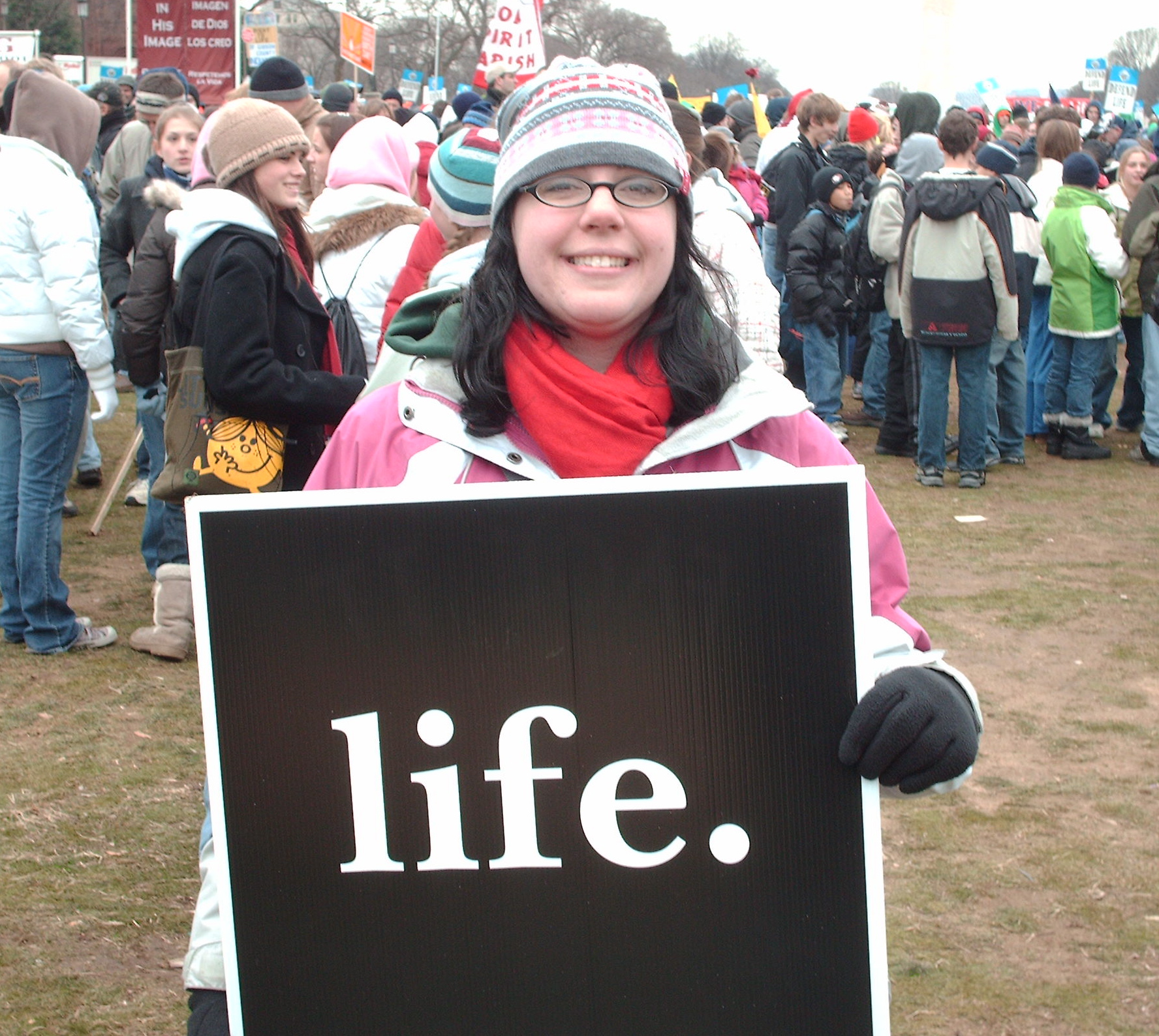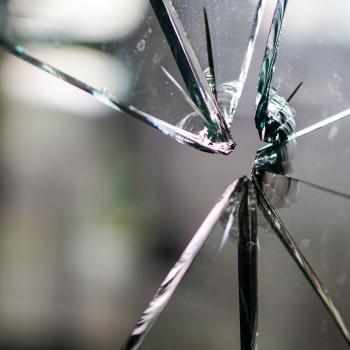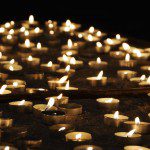So, there’s like a group in Washington today or something. I mean, that’s what I heard. They like have a march to protest the 50 million deaths from abortion since 1973, or something like that. I heard there’s even several hundred thousand people there. I even went twice, and it certainly seemed like that many people to me. What’s really amazing is how none of the major news networks seem to know anything about it. All those hundreds of thousands of people must be wearing the world’s largest invisiblty cloak. Or maybe they’re ninjas. That must be it.
Anyway, since I have a toddler and I’m not marching today, I’m going to share again the story of how I became pro-life, and the role the march had in that conversion. If you haven’t read it before, it’s a long one, but it’s also the truth. Every single word. If what you read today makes you uncomfortable, I invite you to tell me why. Maybe we can talk about it.
I don’t remember the first time I learned what abortion was, but I do remember the first time I formed an opinion about it. I was 14, and had recently attended a conference for Catholic youth at Franciscan University in Steubenville during my summer vacation. The importance of being pro-life was a theme of one of the sessions, and at that moment I remember thinking clearly that abortion was wrong and that I would always be pro-life.
Fast forward a few years to junior year of high school. I had long outgrown the cultural milieu of high school and was longing for college and the reading, debating, and activism I was so excited to be a part of. I had unsuccessfully tried to get a students against capital punishment group going. I had read much about the death penalty and was convinced it was unjust, particularly as applied.
I had attended a retreat through my parish whose theme was “Growing in Faith Through Service”. It was there I learned about social justice for the first time. This was the year 2000 and Pope John Paul II had proclaimed a Jubilee year! I had no idea what that meant, but I learned more at this retreat. About the staggering debt that many third world nations were (and continue to be) trapped under because of unjust economic structures and institutions. Social Justice was a natural fit for me. It fit with my understanding of God’s love, mercy, and compassion. It still does.
However, around the same time, my faith began to wain. A lot. My politics continued to veer left at a dramatic speed, while the connection of faith, which tempers our political views so that they mirror God’s will, was stretched to the breaking point. I abandoned my pro-life views. I began to read feminist thinkers like Gloria Steinem, Betty Fredian, and other second wave feminists. I had always admired feminist foremothers like Susan B. Anthony and Elizabeth Cady Stanton. It would only be much later that I’d learn that the women who fought for the right to vote, also fought for the right to life. All of the first wave feminists were pro-life, and actually fought to put anti-abortion laws on the books, as a way of protecting women. (thanks to Serrin Foster’s “Feminist Case Against Abortion” for pointing that out)
By the time I reached my small, Catholic, liberal arts college as a freshman, I was as deeply entrenched in pro-abortion philosophy as I had been pro-life just a few years before. I *knew* that many thousands of women had died in illegal abortions in the years leading up to Roe. (Dr. Bernard Nathanson and other founders of NARAL made up the numbers in order to ensure NOW support.) I *knew* that women had to be able to have an abortion in able to be equal to men. (Patently untrue, as all men and women *are* equals just by virtue of their existence) I *knew* that no woman should be forced to choose between a career, an education, or a child. I still *know* this, but I also *know* that killing someone is never the way to solve a problem, and that other solutions are possible!
I knew what the Church taught about abortion. My relationship with God and the Church was strained at best during the first few years of college, so I mostly ignored the Church and thought (and did) what I wanted to anyway. Most of my friends felt the same.
Everything started to change when I walked into my required junior year theology elective #1. Within a month I decided to add theology as a discipline to my regular coursework. I loved theology; in learning about God, my relationship with God was strengthened. As I took more theology classes, I made some friends who were pro-life. Of course, I didn’t know they were pro-life when I started hanging out with them. I figured, if I’m Catholic, and I love theology and I’m pro-choice, there must be some others like me. There were a few, but as I’d come to learn, not many. Not in the theology department of Mount St. Mary’s!
I was working through a lot of things during that time. I was trying to figure out who God was to me, who I was to the world, and what I believed to be true. I knew the Church was right on the money with many, many social issues, but I did not see how I could ever “buy into” the teaching on abortion, or God-forbid, contraception.
I thought the teaching on abortion was insensitive; that it “punished” women for making a mistake. I saw pro-lifers who were in favor of capital punishment, saw no issue with the military-industrial complex, and did not want to help the poor beyond writing a charity check at Christmas. I used these inconsistencies among pro-lifers themselves as an excuse to reject the teaching out of hand. In retrospect I see there was something of a ‘haze’ over me, in which I could not understand why such otherwise intelligent, well-spoken, reasonable people could hold such “draconian” views on “choice”. I was happy to accept “enlightened” positions on capital punishment, just wage, and other issues I was learning about in classes, but wanted no part of knowing the portion of CST pertaining to life issues.
One friend in particular challenged me; she pushed me to go back and re-read the familiar documents of Catholic social thought that we had studied. In my work with the college’s Campaign to End the Death Penalty, a particular favorite of mine was Evangelium Vitae (The Gospel of Life) and Gaudium et Spes. I basically just read the sections on capital punishment and other social justice issues, ignoring everything else.
I prayed for an open mind, prayed for the sincere desire to form my beliefs by what our faith teaches. Ironically, some of the very passages I now count among my favorites were almost too much to bear at that time. I wrestled with Gaudium et Spes, paragraph 27:
Furthermore, whatever is opposed to life itself, such as any type of murder, genocide, abortion, euthanasia or willful self-destruction, whatever violates the integrity of the human person, such as mutilation, torments inflicted on body or mind, attempts to coerce the will itself; whatever insults human dignity, such as subhuman living conditions, arbitrary imprisonment, deportation, slavery, prostitution, the selling of women and children; as well as disgraceful working conditions, where men are treated as mere tools for profit, rather than as free and responsible persons; all these things and others of their like are infamies indeed. They poison human society, but they do more harm to those who practice them than those who suffer from the injury. (GS 27)
What a great paragraph, I thought, except that one word. Why should abortion be considered an “infamy”? Wasn’t it a necessary part of women’s liberation, needed for women to participate in society? I kept reading, and fought with these texts, in one bout of frustration screaming, “What do you want me to do?” at the book until the librarian quietly scolded me.
I moved on to the document which I knew would challenge me the most, Evangelium Vitae. First I read the sections on capital punishment again, knowing the words would be soothing, not incensing. It was hard to read the encyclical when it came to the abortion section. I assumed the reasons for the Church’s opposition would be fundamentally anti-woman; “she got herself into this position, now she has to deal with it”, “women should be barefoot and pregnant, not out in the world”, or something to that effect. It was not those reasons found therein, but ones that were similar to others I had heard, reasons I had embraced for opposing other injustices.
It was this in particular which struck me:
“As far as the right to life is concerned, every innocent human being is absolutely equal to all others. This equality is the basis of all authentic social relationships which, to truly be such, can only be founded in truth and justice, recognizing and protecting every man and woman as a person and not as an object to be used.” (EV 57).
When I read that, I found myself nodding in agreement; after all, was this not the same reasoning I used to protest the injustice of wage theft, of worker exploitation, and even to advocate for the equality of women? It was, and I did not expect it. I did not expect to be moved by it; I was.
“Every innocent human being is absolutely equal to all others”. This is the kind of statement that either is true, or is not true. It cannot be sometimes true, and other times expendable. It really became that clear to me. The Church defends the life of the unborn not because it hates women, but because it has to. Believing the above statement to be true, one is compelled to act. This action on behalf of victims of war, oppression, racism, sexual abuse, is also on behalf of workers, families, and yes, even the unborn. **In fact, if the section were written by me, I don’t know that I would even include the word “innocent”. I understand its inclusion, but do believe that all human life is sacred, regardless of whether it is “innocent” or not. That is a post for another time.**
I understood for the first time the beauty and continuity of the Catholic Social Teachings on the dignity of the human person. That experience was the beginning of a fundamental shift in my attitude about life, the purpose of the human person, and the primacy of the social teaching of the Church as the thing that forms and guides my ethical beliefs, choices, and attitudes.
Though the shift began that day, it was a slow evolution. I spent a long time believing that abortion was wrong personally, but being very hesitant to call for legal restrictions on the procedure, “not wanting to impose my beliefs on others”. Looking back on it, I realize how incongruous this position was, as I was more than happy to “impose my beliefs on others” when it came to ending capital punishment and upholding the rights of workers or a myriad of other issues.
Attending the March for Life in January 2006 was another key event in my evolution. I still believed abortion should be legal, but was interested to attend the event as an observer, simply to see what it was all about. Other than being shocked at the well over 100,000 people in attendance, the thing that most struck me was hearing several women from the Silent No More awareness campaign speak about their abortion experiences. These were women who had legal abortions anywhere from two to twenty years ago, and had come to later regret this “choice”. I heard stories full of pain from women who felt pressured to abort, felt trapped by poverty or abuse, or just felt abandoned and alone. All chose abortion not because that is what they truly wanted, but because they had no community to support them or help them find another way. What I witnessed in those women was a fundamental failure of love on the part of our society. These were women – the very same women whom I had believed were aided by legal abortion – whose human dignity was violated by participating in a procedure which I had advocated as a “mark of our progress toward equality”. I felt sick and as though I had been lied to.
In Gaudium et Spes, paragraph 27, torture is considered an intrinsic evil and infamy because it violates the human dignity not only of the one tortured, but of the one inflicting the pain as well. I came to a point where I had to view abortion in the same way; participation in it, whether direct or through complicit approval, diminishes us as human persons. It violates the dignity of each person involved; the baby whose life is snuffed out before having a chance to live, the mother who is dehumanized by those who would judge her a murderer for aborting, or those who would condemn her a fool for choosing life, and the abortionist who ends the child’s life. As with other scourges, like war and torture, abortion dehumanizes all of us. It makes our society more violent, it teaches people that it is accpcetable to use violence to achieve one’s ends, and does not draw us closer to the Kingdom of God, which is the hoped for and desired end for all of the social teachings of the Church.
To sum up, I am pro-life because (1) It is never acceptable to use violence to solve your problems (excepting self-defense) and (2) it is always wrong to kill human beings (excepting self-defense), and even more so when that human being is innocent and defenseless, be they an unborn child, an aged person, someone in a coma, an “unwanted” baby girl in China, a profoundly autistic person.
“As far as the right to life is concerned, every innocent human being is absolutely equal to all others. This equality is the basis of all authentic social relationships which, to be truly such, can only be founded on truth and justice, recognizing and protecting every man and woman as a person and not as an object to be used. Before the moral norm which prohibits the direct taking of the life of an innocent human being “there are no privileges or exceptions for anyone. It makes no difference whether one is the master of the world or the ‘poorest of the poor’ on the face of the earth. Before the demands of morality we are all absolutely equal.” – Evangelium Vitae












